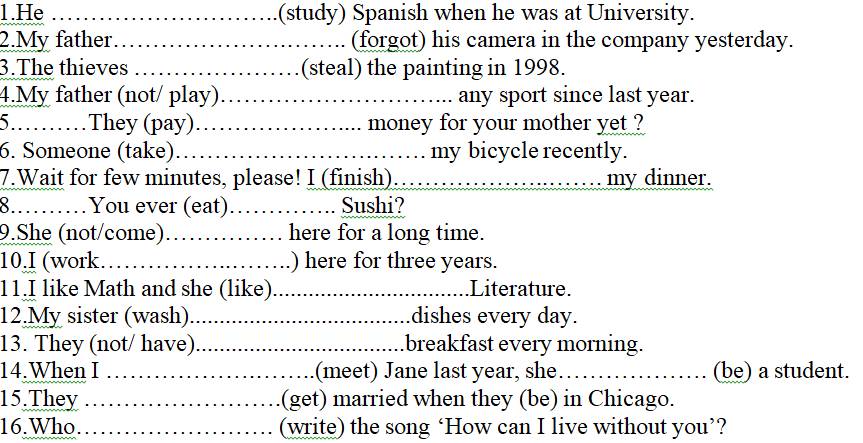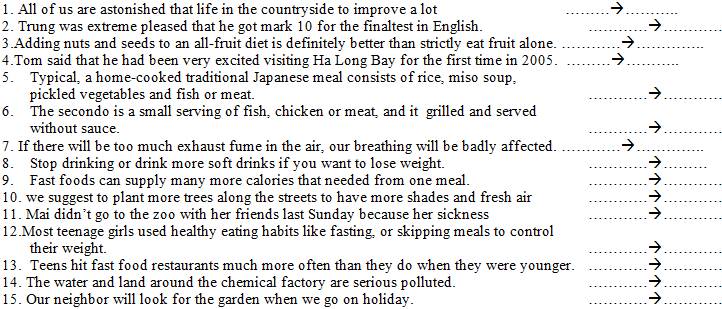Học tại trường
Chưa có thông tin
Đến từ
Chưa có thông tin , Chưa có thông tin
Số lượng câu hỏi
88
Số lượng câu trả lời
5
Điểm GP
0
Điểm SP
0
Người theo dõi (0)
Đang theo dõi (1)


Chủ đề:
Luyện tập tổng hợpCâu hỏi:
Good manners are a treasure to the people who possess them, as well as to the community they live in. Manners are taught, learnt, and passed from generation to generation. Even hundreds of years ago, children were taught to behave responsibly. They learnt to respect seniority. When they passed an object to another person, they had to use both hands. When they entered a room, they had to bow and greet the oldest person first. Boys learnt to work hard to support their families. Girls learnt to do housework, and to take care of others. Loyalty and honesty were highly appreciated. When they made a mistake, they would not let another person be punished for it. That would be cowardly and mean. They were taught that families were strong, and everybody should stick together in adversity. Fortunately, many of these values have been well preserved. They have contributed to making the unique Vietnamese culture, and strengthening our society. 1. Good manners are considered valuable to both individuals and the community as a whole. 2. Manners are learned and taught, and passed down from generation to generation. 3.Children were taught responsible behavior, such as respecting seniority and using both hands to pass objects. 4. Boys were taught to work hard and girls were taught housework and caring for others. 5. Loyalty, honesty, and the importance of family were highly invalued and have contributed to Vietnamese culture and society.

Chủ đề:
Luyện tập tổng hợpCâu hỏi:
When Laura was a university student in the city, she found it very difficult to live on her grant when prices were going up all the time, so she decided to look for a part-time job. When she saw an advertisement in the paper for snack bar staff, she sat down to apply for the job. She wasn't sure how best to present herself on paper, so she just put down the details of her education and experience. The owner of the bar rang some days later to ask her to come for an interview the following day. When she arrived, she was nervous because she felt sure he could see through her claims to have worked as a waitress before, and would turn her down. But finally the interview was over, and he shook hands with her and said, ‘See you next week, then!' When Laura was a university student in the city, she found it very difficult to live on her grant when prices were going up all the time, so she decided to look for a part-time job. When she saw an advertisement in the paper for snack bar staff, she sat down to apply for the job. She wasn't sure how best to present herself on paper, so she just put down the details of her education and experience. The owner of the bar rang some days later to ask her to come for an interview the following day. When she arrived, she was nervous because she felt sure he could see through her claims to have worked as a waitress before, and would turn her down. But finally the interview was over, and he shook hands with her and said, ‘See you next week, then!' 1. Laura found it easy to live on her grant as a university student in the city. 2. Laura applied for a job at a snack bar after seeing an advertisement in the paper. 3. Laura presented a detailed list of her skills and qualifications when applying for the job. 4. Laura was nervous during her interview because she thought the owner would know she had never worked as a waitress before. 5. Laura was rejected for the job at the snack bar.

Chủ đề:
Luyện tập tổng hợpCâu hỏi:
When Laura was a university student in the city, she found it very difficult to live on her grant when prices were going up all the time, so she decided to look for a part-time job. When she saw an advertisement in the paper for snack bar staff, she sat down to apply for the job. She wasn't sure how best to present herself on paper, so she just put down the details of her education and experience. The owner of the bar rang some days later to ask her to come for an interview the following day. When she arrived, she was nervous because she felt sure he could see through her claims to have worked as a waitress before, and would turn her down. But finally the interview was over, and he shook hands with her and said, ‘See you next week, then!' When Laura was a university student in the city, she found it very difficult to live on her grant when prices were going up all the time, so she decided to look for a part-time job. When she saw an advertisement in the paper for snack bar staff, she sat down to apply for the job. She wasn't sure how best to present herself on paper, so she just put down the details of her education and experience. The owner of the bar rang some days later to ask her to come for an interview the following day. When she arrived, she was nervous because she felt sure he could see through her claims to have worked as a waitress before, and would turn her down. But finally the interview was over, and he shook hands with her and said, ‘See you next week, then!' 1. Laura found it easy to live on her grant as a university student in the city. 2. Laura applied for a job at a snack bar after seeing an advertisement in the paper. 3. Laura presented a detailed list of her skills and qualifications when applying for the job. 4. Laura was nervous during her interview because she thought the owner would know she had never worked as a waitress before. 5. Laura was rejected for the job at the snack bar.





Chủ đề:
Luyện tập tổng hợpCâu hỏi:
students letter change benefit interest however disadvantage
traditional pen pals can be a very good way to motivate (1) to write .Children share information about themselves, their family, favorite things, (2) , hobbies, ect. to each other. The use of the postal service in a pen pal relationship allows children to (3) photos, coins and other small items which are (4) to children. Further, children often enjoy looking at the stamps and letters that come from other places






